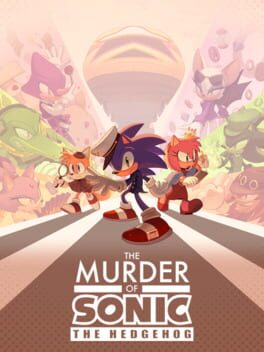damberg
89 reviews liked by damberg
Hypnospace Outlaw
2019
Better than nostalgia – there’s genuine affection for how the internet used to be before the forces of social media, ad sales, and consolidation ground everything up into pink Nazi slime. And the affection is clear-eyed, gently suggesting that all we ever did was swap one flavor of bullshit for another. On top of all that, the relentless dedication to its aesthetic goes toe-to-toe with any Kingdom Hearts game you could name. A few puzzles slightly miss the mark towards the end, but whether or not you were around for the AOL days, this shouldn’t be missed. The mods have always been useless tyrants, the teens have always been cringe, and the people running the whole thing have always been dipshits. May the zoomers (and everyone else) forgive us.
Journey
2012
Pentiment
2022
PaRappa the Rapper
1996
Death Stranding
2019
Pentiment
2022
I don't have a deep history with Sonic, I just really appreciate the direction the series has gone lately. There's such a sincere joy Sega seems to have rediscovered in these characters, from Sonic Frontiers to the Sonic comic stuff to this. Its what this franchise needed for a long time.
It would've been so easy to do a cheap "dating sim" joke that devs keep making on April Fools, but they committed to a delightful adventure. And you can tell the devs actually care about visual novels and understand the history. If you try to submit your name as "Ushiromiya" or "Phoenix Wright" the game MC politely says "we don't want to get in trouble." It cares about this genre and isn't looking for a cheap gag. They love these worlds, they love this medium, and they have genuine artistic talent behind it. Its really admirable.
It would've been so easy to do a cheap "dating sim" joke that devs keep making on April Fools, but they committed to a delightful adventure. And you can tell the devs actually care about visual novels and understand the history. If you try to submit your name as "Ushiromiya" or "Phoenix Wright" the game MC politely says "we don't want to get in trouble." It cares about this genre and isn't looking for a cheap gag. They love these worlds, they love this medium, and they have genuine artistic talent behind it. Its really admirable.
Pentiment
2022
It’s important that you treat Pentiment with the same scrutiny and scepticism that you (hopefully) do with any other historical source. Most media, not just videogames, are, politely put, atrocious at dealing in good faith with the settings and themes that Pentiment tackles, to the point where it’s probably reasonable to call it one of the most authentic games ever made in this regard. The flip side of this is that it makes the things Pentiment gets wrong feel more conspicuous than they would be otherwise.
If that last part has your guard up, you can safely lower it, because Pentiment’s small handful of inaccuracies are pretty minor in that they don't affect the plot overmuch. I won’t say what they are specifically, because this is the type of game where any and all details ought to be discovered yourself, but among other things, they include at least two cultural events which are unambiguously Christian being misattributed to Alpine paganism of some description, as well as one figure who was (to my knowledge) neither pre-Christian nor worshipped as a goddess being described as a pre-Christian goddess.
There are a couple of reasons why these don’t overly strain Pentiment’s believability and for which it deserves to be given the benefit of the doubt. For starters, relative to the vast majority of media set during the early modern period and (in this case, just after the) Middle Ages, Pentiment’s immensely tactful to the point where I'm (almost but not quite) inclined to think these kinds of mistakes were intentionally included, on the part of its characters rather than its writers; that it avoids the common error of misattributing the origins of Christian saints to pagan figures further suggests this. More broadly, it’s unreasonable to expect anything to be perfect in terms of accuracy and – on exceedingly rare occasions, in exceptionally talented hands – inaccuracies can be advantageous. Excalibur’s a more visually distinctive and symbolic film for featuring armour which is about 1000 years too advanced for the 5th/6th century AD. Shadow of Rome’s a more memorable game for making you fight a ~15ft tall Germanic barbarian whose weapon of choice is a marble pillar. Likewise, in a meta sort of way, Pentiment’s central idea of historiographical truth being difficult to pinpoint is arguably strengthened by its own shortcomings in this respect. Ideally, this’ll encourage players to be more wary of any historically-themed media they engage with, including Pentiment itself.
Any such grievances are further obscured by the mostly impressive weight Pentiment lends to your decisions. I had the fortune of playing through Pentiment concurrently with my brother, and when we’d walk in on each other playing it, we’d do mutual double takes as one of us was in the middle of story events that the other didn’t even consider would be possible. Speech checks being affected by past dialogue choices encourages you to constantly, properly pay attention to and think about what you’re saying in a way I personally haven’t seen done since the isometric Fallouts or Vampire the Masquerade Bloodlines. Although its time limits (while appreciated) aren’t implemented as organically as Fallout 1’s, an advantage Pentiment has over even those titans is that it also autosaves after every single action you take, lending everything a degree of permanence that few other RPGs can offer. If you were feeling particularly cheeky, you could go as far as to say that Pentiment can be counted alongside the campaign of Black Ops 2 in the pantheon of games which actually are what everyone pretends New Vegas is.
I call it only mostly impressive because Pentiment’s key weakness is the linearity of its third and final act, which even if you’re being charitable can only really be called overbearing. Not to bang on the choices-don’t-matter drum too hard, because nobody can ever seem to agree what choices mattering in a game really looks like, but you’re much more likely to wish you were able to say or do something other than the options you’re given in the last act than in the preceding two. Potential twists and turns you might hope to direct this chapter’s plot towards are often snuffed out by blurted out variations of “actually, I was only pretending to want to do that” that you rarely have any control over. This isn’t to suggest that Pentiment ends on a sour note – the ending itself’s quite lovely – but from a decision making standpoint, the whole last stretch’s noticeably more limiting.
However close it comes, this is never enough to distract from Pentiment’s visual splendour. Jan van Eyck paintings and The Tragedy of Man are the only other media I can think of which incorporate so many different historical art styles into one cohesive package and so skilfully. Sebhat being drawn in the style of Ethiopian Coptic Orthodox art’s a particularly inspired touch, but in general it’s no wonder that the art director and animators are the first names to pop up on the opening credits, because it’s like a playable manuscript. Rarely do you come across a game where you can legitimately say that the visuals are a selling point in and of themselves.
There should be more games like Pentiment. It represents two things we need more of – big developers putting out more niche, experimental titles, and historical media which isn’t riddled with self-congratulatory 21st century arrogance that spits on the memory of everyone who happened to be born before an arbitrary point in time, in which characters actually believe what they say and aren’t one-dimensional caricatures of the past. Be thankful it exists, whatever its issues.
If that last part has your guard up, you can safely lower it, because Pentiment’s small handful of inaccuracies are pretty minor in that they don't affect the plot overmuch. I won’t say what they are specifically, because this is the type of game where any and all details ought to be discovered yourself, but among other things, they include at least two cultural events which are unambiguously Christian being misattributed to Alpine paganism of some description, as well as one figure who was (to my knowledge) neither pre-Christian nor worshipped as a goddess being described as a pre-Christian goddess.
There are a couple of reasons why these don’t overly strain Pentiment’s believability and for which it deserves to be given the benefit of the doubt. For starters, relative to the vast majority of media set during the early modern period and (in this case, just after the) Middle Ages, Pentiment’s immensely tactful to the point where I'm (almost but not quite) inclined to think these kinds of mistakes were intentionally included, on the part of its characters rather than its writers; that it avoids the common error of misattributing the origins of Christian saints to pagan figures further suggests this. More broadly, it’s unreasonable to expect anything to be perfect in terms of accuracy and – on exceedingly rare occasions, in exceptionally talented hands – inaccuracies can be advantageous. Excalibur’s a more visually distinctive and symbolic film for featuring armour which is about 1000 years too advanced for the 5th/6th century AD. Shadow of Rome’s a more memorable game for making you fight a ~15ft tall Germanic barbarian whose weapon of choice is a marble pillar. Likewise, in a meta sort of way, Pentiment’s central idea of historiographical truth being difficult to pinpoint is arguably strengthened by its own shortcomings in this respect. Ideally, this’ll encourage players to be more wary of any historically-themed media they engage with, including Pentiment itself.
Any such grievances are further obscured by the mostly impressive weight Pentiment lends to your decisions. I had the fortune of playing through Pentiment concurrently with my brother, and when we’d walk in on each other playing it, we’d do mutual double takes as one of us was in the middle of story events that the other didn’t even consider would be possible. Speech checks being affected by past dialogue choices encourages you to constantly, properly pay attention to and think about what you’re saying in a way I personally haven’t seen done since the isometric Fallouts or Vampire the Masquerade Bloodlines. Although its time limits (while appreciated) aren’t implemented as organically as Fallout 1’s, an advantage Pentiment has over even those titans is that it also autosaves after every single action you take, lending everything a degree of permanence that few other RPGs can offer. If you were feeling particularly cheeky, you could go as far as to say that Pentiment can be counted alongside the campaign of Black Ops 2 in the pantheon of games which actually are what everyone pretends New Vegas is.
I call it only mostly impressive because Pentiment’s key weakness is the linearity of its third and final act, which even if you’re being charitable can only really be called overbearing. Not to bang on the choices-don’t-matter drum too hard, because nobody can ever seem to agree what choices mattering in a game really looks like, but you’re much more likely to wish you were able to say or do something other than the options you’re given in the last act than in the preceding two. Potential twists and turns you might hope to direct this chapter’s plot towards are often snuffed out by blurted out variations of “actually, I was only pretending to want to do that” that you rarely have any control over. This isn’t to suggest that Pentiment ends on a sour note – the ending itself’s quite lovely – but from a decision making standpoint, the whole last stretch’s noticeably more limiting.
However close it comes, this is never enough to distract from Pentiment’s visual splendour. Jan van Eyck paintings and The Tragedy of Man are the only other media I can think of which incorporate so many different historical art styles into one cohesive package and so skilfully. Sebhat being drawn in the style of Ethiopian Coptic Orthodox art’s a particularly inspired touch, but in general it’s no wonder that the art director and animators are the first names to pop up on the opening credits, because it’s like a playable manuscript. Rarely do you come across a game where you can legitimately say that the visuals are a selling point in and of themselves.
There should be more games like Pentiment. It represents two things we need more of – big developers putting out more niche, experimental titles, and historical media which isn’t riddled with self-congratulatory 21st century arrogance that spits on the memory of everyone who happened to be born before an arbitrary point in time, in which characters actually believe what they say and aren’t one-dimensional caricatures of the past. Be thankful it exists, whatever its issues.






